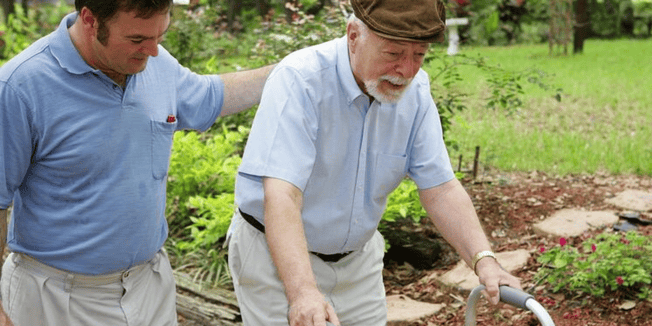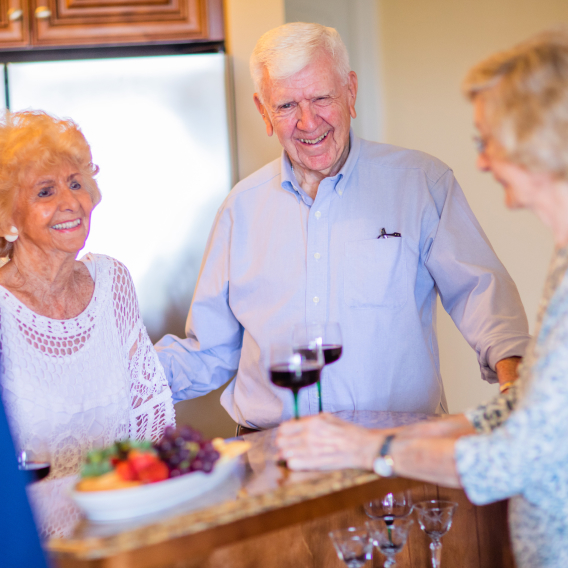
Adult children often worry about their parents and loved ones as they age. You may be concerned whether they’re sleeping and eating well, and you may be especially on the alert about potential senior falls.
The good news: There are strategies to help your loved one avoid falls as well as ways to adjust your loved one’s living space to make it safer. We’ve compiled a list of the best (and simplest) practices to help your loved one avoid falls in their living space.
Best Practices to Help Seniors Avoid Falls
Senior falls are quite common because of a variety of factors that can make the gait unsteady or decrease balance as people age. According to the Centers for Disease Control and Prevention, approximately one out of four seniors fall each year, but this rate is believed to be higher because many falls aren’t reported.
Falls don’t have to be inevitable as your parent or loved one ages. You can reduce the chance of senior falls with some simple lifestyle adjustments.
Adopt an active lifestyle.
A regular exercise routine has numerous benefits for your loved one’s health. In addition to improving brain health and reducing the risk of certain diseases, regular exercise that aligns with your senior loved one’s mobility level can help improve their ability to do daily activities as well as strengthen their muscles and bones.
Exercises that make your parent’s or loved one’s legs stronger are especially beneficial for improving balance. To help them get regular exercise, be a part of their exercise routine. Many benefits result from accompanying your parent or loved one on frequent walks or taking light exercise classes with them. In addition to health benefits, it also provides valuable quality time to spend together.
Consult a doctor regularly.
Make sure your parent or loved one is attending their doctor’s appointments and speaking with their doctor frequently. When it comes to reducing fall risk, specifically, ask their doctor about vitamin and medication reviews (both prescription and over-the-counter medications) to see if any may make them dizzy or tired.
Sleep well.
Research shows that a short sleep duration of five hours or less increases the risk of senior falls and the risk of injury from a fall. This is because a lack of sleep can impair an individual’s balance and reduce reaction time.
Some ways to help your parent or loved one get a good night’s sleep include ensuring your loved one has a comfortable mattress, pillow, and blankets. Finding ways to relax before bed will also help. Some pre-sleep calming activities could include reading a book, doing a crossword puzzle, or engaging in gentle stretches.
Living Space Tips to Prevent Senior Falls
An essential way to prevent senior falls is to make sure your parent’s or loved one’s living space is arranged for their specific abilities and challenges.
Choose appropriate footwear.
Certain types of shoes increase the risk of falling, including:
- Shoes with narrow or high heels
- Shoes with smooth soles
- Shoes without laces, buckles, or straps
Make sure your parent or loved one’s shoes aren’t too flexible while remaining sturdy to provide stability. If your loved one prefers to walk around their living space in socks, choose socks with grips on the bottom.
Provide good lighting.
Low vision is one of the largest contributing factors to senior falls. A quick fix to decrease the risk of falls is to improve lighting in your parent’s or loved one’s home.
Make sure hallways, stairwells, and darker spots in the house have adequate lighting. Adding nightlights along the path from the bedroom to the bathroom can prevent falls when your loved one needs to use the restroom in the middle of the night. Secure any cords to prevent the new lights from becoming a tripping hazard.
Make the bathroom safer.
A large number of senior falls happen in the bathroom because of slippery conditions. Adding grab bars inside and outside of the shower or tub, as well as next to the toilet, will provide extra stability. Skid-proof rugs on the bathroom floor as well as non-skid mats inside of the tub or shower are essential for extra traction when your loved one is bathing.
Remove clutter.
Make sure your parent’s or loved one’s living space is free of clutter. Clear out a wider path for a wheelchair, cane, or walker for your loved one to move throughout the living space. If pieces of furniture crowd commonly used pathways, reorganize the living space or rightsize unused items. Make sure to keep pathways clear of books, boxes, and other items that may be a tripping hazard.
While removing clutter, evaluate rugs and cords in the room. Rugs are a common tripping hazard, so secure loose rugs or remove them from the living space. Also, make sure no cords are running along the floor to reduce the risk of falling.
Is It the Right Time for Senior Living?
Senior living communities can provide the physical support and secure environment your parent or loved one needs. These communities have trained staff and specially designed living spaces to keep your loved one safe, including preventing falls.
Is it the right time to consider senior living? Here are a few signs:
Your loved one is falling more often.
You’ve done the work to adjust your loved one’s living space to prevent falls, but you’re still noticing bruises, scrapes, or painful grimaces as they get up or down from a chair—this is a sign they may need additional daily support. Senior living communities offer specially trained, around-the-clock staff to assist your loved one, as well as emergency response systems and resources focused on improving balance in order to prevent falls.
Your loved one is showing signs of poor nutrition.
Look around your loved one’s kitchen for any indications that their nutritional needs aren’t met. For example, are they relying on takeout or processed foods? Is their fridge empty every time you visit? Are they losing or gaining weight? These warning signs indicate they may need additional support, such as the health-focused meal options and regular meal times offered in senior living communities.
Your loved one is dealing with isolation and loneliness.
As we age, our social circle naturally gets smaller. This is especially true if your loved one lives alone and has mobility challenges or limited driving abilities. Loneliness can negatively impact overall health and cause increased depression, anxiety, cognitive decline, and other complications. Senior living communities are built with socialization in mind, providing plenty of daily opportunities to meet new people while nurturing existing connections with friends and family.
Your loved one has experienced medication errors.
Many seniors take more than one medication per day, which can increase the risk of harmful medication mistakes. Staff members in senior living communities can assist with many care services, including medication management.
Not sure which lifestyle option is right for you? Learn about your options and get personalized results in about 4 minutes.
Take the AssessmentNext Steps for Senior Safety
Adjusting your parent’s or loved one’s living space by removing clutter, adding supports in the bathroom, and making sure there’s appropriate lighting are essential for preventing falls. However, sometimes aging adults require a specially designed living space that meets their unique changes such as mobility issues or other conditions.
Senior living communities are an ideal environment to address these challenges—and more—in a welcoming atmosphere with wellness resources, plenty of lighting, and accessible living spaces.
Learn more about senior living communities and how they support residents’ physical, mental, spiritual, and social needs with our comprehensive guide, The Holistic Approach to Aging and Health with Senior Living.




.png?width=307&height=200&name=Blog%20%2333%201400%20x%20700%20(1).png)

.png?width=307&height=200&name=Blog%20%2332%201400%20x%20700%20(8).png)



